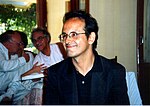Systems theory in archaeology is the application of systems theory and systems thinking in archaeology. It originated with the work of Ludwig von Bertalanffy... 4 KB (621 words) - 10:01, 14 June 2023 |
Archaeological theory refers to the various intellectual frameworks through which archaeologists interpret archaeological data. Archaeological theory... 22 KB (2,807 words) - 01:04, 1 April 2024 |
loops, and time delays. Systems theory in anthropology Systems theory in archaeology Systems theory in political science Systems psychology is a branch... 54 KB (6,130 words) - 02:21, 21 April 2024 |
general systems theory) Applied multidimensional systems theory Archaeological systems theory (also see: Systems theory in archaeology) Systems theory in anthropology... 31 KB (3,865 words) - 21:58, 11 March 2024 |
Systems theory in anthropology is an interdisciplinary, non-representative, non-referential, and non-Cartesian approach that brings together natural and... 34 KB (4,818 words) - 21:36, 1 February 2024 |
their work with workers in English coal mines at the Tavistock Institute in London. Sociotechnical systems pertains to theory regarding the social aspects... 46 KB (6,051 words) - 00:12, 26 March 2024 |
environment. James Grier Miller's living systems theory is a general theory about the existence of all living systems, their structure, interaction, behavior... 23 KB (2,761 words) - 11:35, 12 January 2024 |
A glossary of terms relating to systems theory. Adaptive capacity: An important part of the resilience of systems in the face of a perturbation, helping... 13 KB (1,763 words) - 10:25, 12 June 2023 |
Control theory is a field of control engineering and applied mathematics that deals with the control of dynamical systems in engineered processes and machines... 45 KB (6,482 words) - 01:40, 16 March 2024 |
 | of quantum systems. In control theory, a physical system being controlled (a "controlled system") is called a "plant". Conceptual systems Phase space... 4 KB (464 words) - 01:31, 11 January 2024 |
behaviour and experience as complex systems. It is inspired by systems theory and systems thinking, and based on the theoretical work of Roger Barker, Gregory... 13 KB (1,238 words) - 21:59, 2 January 2024 |
 | List of academic fields (section Archaeology) Archaeological theory Great ages archaeology Functionalism Processualism Post-processualism Cognitive archaeology Gender archaeology Feminist archaeology Archaeometry... 77 KB (4,657 words) - 23:44, 24 April 2024 |
Murray Bowen (redirect from Bowen family systems theory) Beginning in the 1950s he developed a systems theory of the family. Murray Bowen (Lucius Murray Bowen) was born in 1913 as the oldest of five and grew up in the... 10 KB (1,318 words) - 17:00, 27 April 2024 |
 | In physical science, an isolated system is either of the following: a physical system so far removed from other systems that it does not interact with... 7 KB (886 words) - 09:14, 5 September 2023 |
 | Francisco Varela (category Integral theory (Ken Wilber)) makes extensive reference to Varela and Maturana's theory of autopoiesis as part of a new, systems-based scientific approach for describing the interrelationships... 14 KB (1,338 words) - 19:09, 2 December 2023 |
2020 Systems science portal Biological network Artificial life Biological systems engineering Evolutionary systems Organ system Systems biology Systems ecology... 11 KB (1,165 words) - 01:05, 17 April 2024 |
perspective, information systems are composed by four components: task, people, structure (or roles), and technology. Information systems can be defined as an... 50 KB (5,876 words) - 18:19, 27 April 2024 |
Systems neuroscience is a subdiscipline of neuroscience and systems biology that studies the structure and function of neural circuits and systems. Systems... 3 KB (270 words) - 08:10, 10 February 2023 |
about living, adaptable, changeable systems. Complex adaptive systems may adopt hard or softer approaches. Hard theories use formal language that is precise... 32 KB (3,453 words) - 08:39, 3 April 2024 |
and axioms regarding equality used in first order logic. The two main types of deductive systems are proof systems and formal semantics. Formal proofs... 14 KB (1,536 words) - 07:41, 18 April 2024 |








